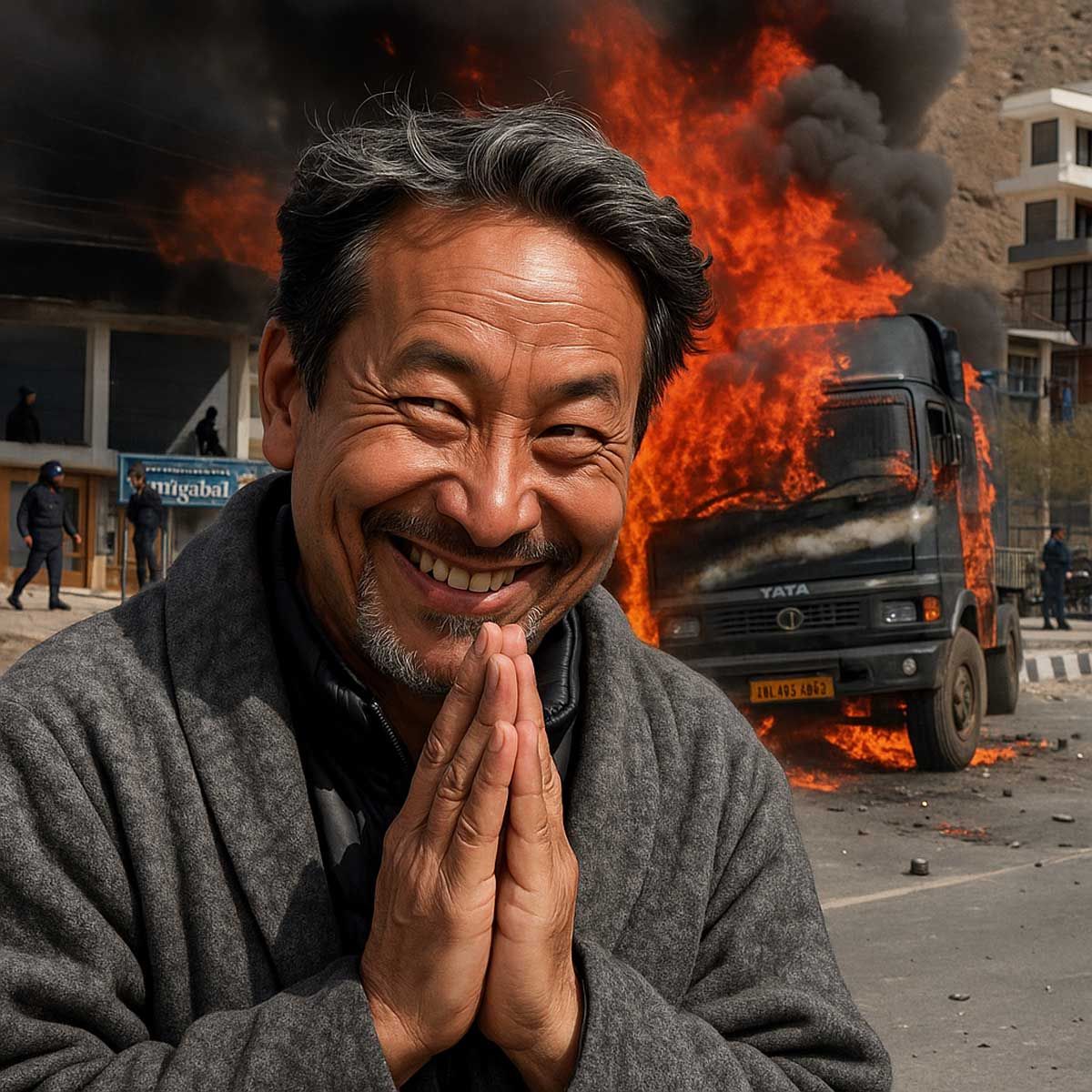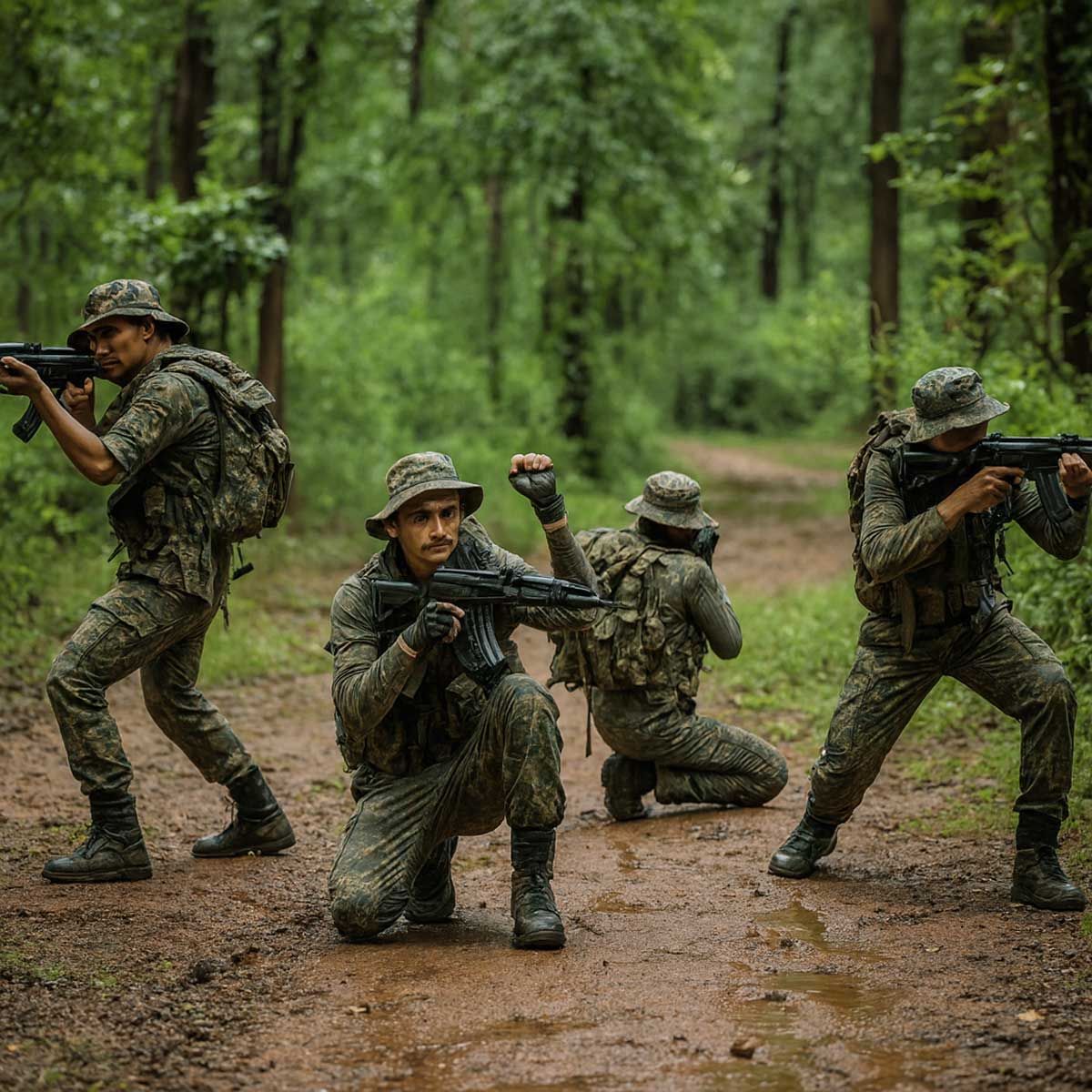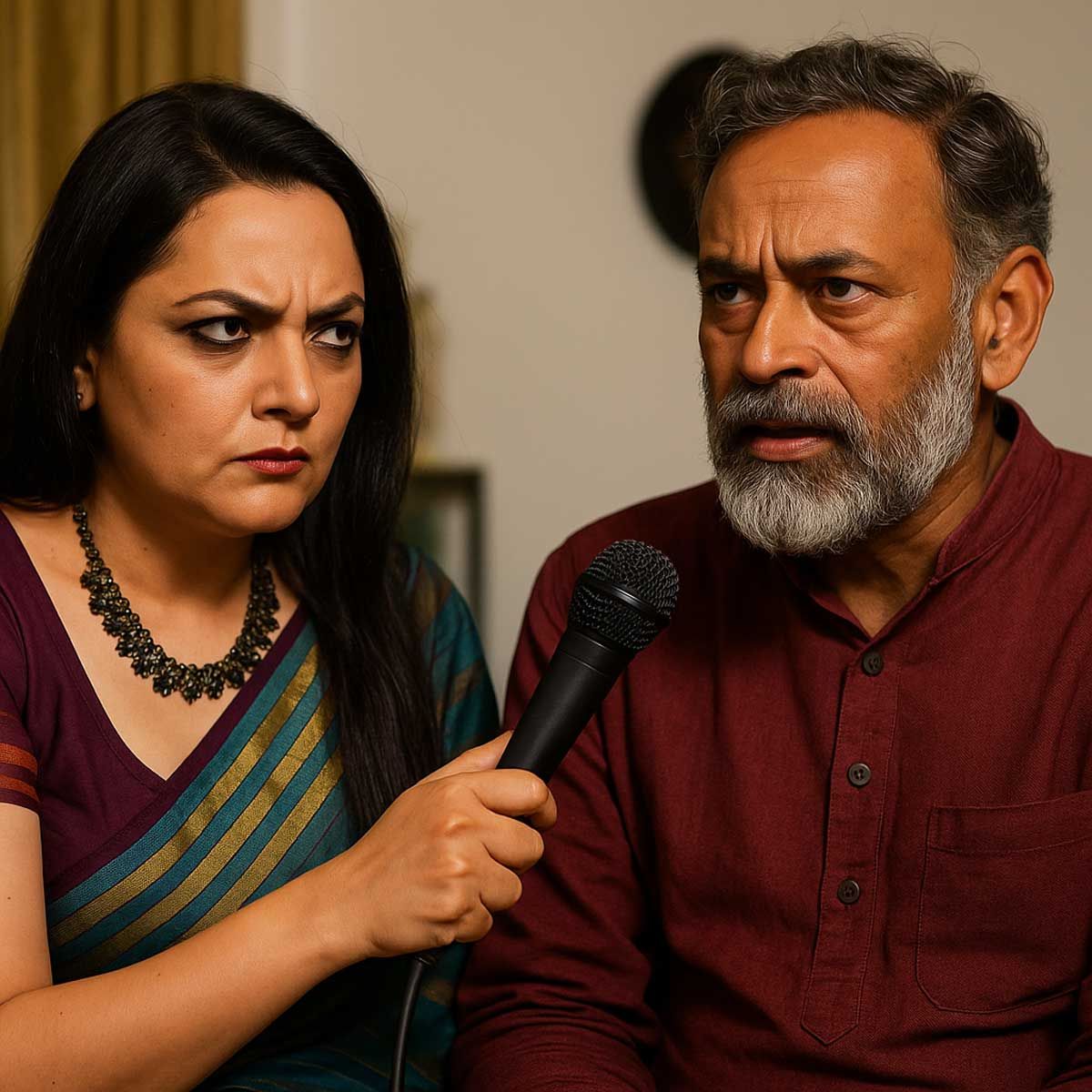More Coverage
Twitter Coverage
Satyaagrah
Written on
Satyaagrah
Written on
Satyaagrah
Written on
Satyaagrah
Written on
Satyaagrah
Written on
JOIN SATYAAGRAH SOCIAL MEDIA
Tasleem Ahmed’s bail plea thrown out as Delhi High Court rules delays in the 2020 North-East Delhi riots conspiracy case were caused by him and co-accused like Umar Khalid and Sharjeel Imam

On 2nd September, the Delhi High Court dismissed the bail plea filed by Tasleem Ahmed, one of the accused in the alleged larger conspiracy behind the 2020 North-East Delhi riots. The Bench clarified that the argument of “delay” raised by Ahmed could not be accepted since the trial record itself showed that the adjournments were repeatedly sought by the co-accused. Many of those co-accused, the Court noted, are already out on bail.
The judges underlined that while the Constitution guarantees the right to a speedy trial, it cannot be stretched to become a loophole by those responsible for stalling proceedings.
|
Defence Argues on Five Years in Custody and Right to Speedy Trial
During the hearing, Ahmed’s lawyer placed heavy reliance on the principle of speedy trial. He pointed out that Ahmed had been in custody since 19th June 2020, meaning he had already spent more than five years as an undertrial without the commencement of the trial itself. The counsel argued that this was a direct violation of Article 21 of the Constitution of India, which safeguards the right to life and personal liberty, including the right to a trial conducted within a reasonable time.
The defence also highlighted that the prosecution had informed the court about its plan to examine hundreds of witnesses. With the case still stuck at the stage of arguments on charge, there was no clear indication of when the trial might realistically begin or conclude. In support of the bail plea, Ahmed’s counsel relied on the Supreme Court’s judgment in K.A. Najeeb, where it was held that prolonged incarceration—even in cases under the stringent Unlawful Activities (Prevention) Act (UAPA)—could be a ground for bail.
The defence contended that liberty could not be indefinitely restricted just because the allegations were grave. In their submission, “liberty cannot be indefinitely curtailed simply because the allegations are serious.” They therefore argued that the sheer length of Ahmed’s custody should tilt the scales in his favour and justify his release on bail.
Prosecution Says Co-Accused Responsible for Dragging Proceedings
The prosecution, represented by the Solicitor General and supported by the Special Public Prosecutor, strongly objected to this line of reasoning. They accepted that in rare cases prolonged custody could justify bail, but insisted that the facts of Ahmed’s case did not permit such relief. To establish their point, they placed on record detailed trial court proceedings that showed how arguments on charge were repeatedly adjourned at the request of the accused themselves.
According to the prosecution, adjournments were sought on multiple occasions by co-accused such as Devangana Kalita, Natasha Narwal, and Asif Iqbal Tanha, all of whom are already out on bail. Moreover, even those still behind bars, like Umar Khalid and Sharjeel Imam, had also sought adjournments, further delaying the process. The trial court itself had taken note of these delays, recording that the repeated requests from the accused were slowing down the case.
The prosecution described this as an attempt to misuse the judicial process. It was argued that this strategy amounted to “gaming the system”—deliberately delaying trial proceedings and then invoking those very delays to seek bail. They stressed that the K.A. Najeeb precedent could not be applied in cases where the delay was “self-inflicted.” They urged the High Court not to allow a situation where the accused benefited from tactics that prolonged the trial in the first place.
Court Notes ‘Systematic Delay’ Caused by the Accused
The Division Bench of Justices Subramonium Prasad and Harish Vaidyanathan Shankar accepted the prosecution’s argument. After reviewing the trial court records, the judges found that adjournments had indeed been sought again and again by the accused, despite an earlier consensus to proceed with arguments. The trial court had even expressed its “distress” over this pattern of conduct in its order dated 4th October 2024.
The High Court made its position clear by stating: “the inordinate delay in trial, as alleged by the Appellant herein, is not due to the inaction of the Respondent Agency or the Trial Court… the accused themselves have been responsible for delaying the trial.”
The judges went further, issuing a caution against the misuse of constitutional protections. They remarked: “Speedy trial is a fundamental right. But to ask for bail after there has been systematic delay in trial on the part of the accused is not acceptable, and if it is done, then the statute which restricts the grant of bail on the ground of delay in trial can easily be circumvented by delaying the trial on the one hand and by pressing bail applications on the other.”
The Court pointed out that Ahmed himself only began advancing his arguments on charge in April 2025, long after he had filed the present appeal. This, the Bench concluded, meant that the delay argument in Ahmed’s case carried no weight.
UAPA’s Tough Bail Bar Stressed
The Bench also emphasised the legal threshold under Section 43D(5) of the UAPA, which prevents bail if the accusations appear “prima facie true.” Referring to the Supreme Court’s ruling in Watali, the Court reiterated that bail under UAPA is to be seen as an exception rather than a norm.
While acknowledging that personal liberty is important, the judges clarified that it cannot outweigh the gravity of offences linked to terrorism or conspiracies against the State. They underlined that long custody by itself—without other compelling factors—was not sufficient to secure release on bail in such serious cases.
Case Background
Tasleem Ahmed is listed as Accused No. 12 in FIR 59/2020, which is the principal case relating to the alleged conspiracy behind the February 2020 riots in Delhi. He faces charges under several provisions, including sections of the Indian Penal Code (IPC), the Arms Act, the Prevention of Damage to Public Property Act, and the UAPA, particularly those relating to terrorism and conspiracy.
According to the prosecution, the riots were not random or spontaneous but were instead part of a “deep-rooted conspiracy” timed to coincide with the visit of the then US President, Donald Trump. The violence led to the deaths of 53 people, caused injuries to scores of civilians and police officers, and resulted in large-scale destruction of public and private property.
Ahmed is among a group of accused that includes student activists, local political figures, and organisers of protest sites, whom the police allege had different but coordinated roles in the conspiracy.
By rejecting Ahmed’s plea, the Delhi High Court has sent out a strong message: while the right to a speedy trial is inviolable, it cannot be turned into a loophole by those accused of deliberately dragging proceedings and then using the very delays as grounds to seek bail.
 Support Us
Support Us
Satyagraha was born from the heart of our land, with an undying aim to unveil the true essence of Bharat. It seeks to illuminate the hidden tales of our valiant freedom fighters and the rich chronicles that haven't yet sung their complete melody in the mainstream.
While platforms like NDTV and 'The Wire' effortlessly garner funds under the banner of safeguarding democracy, we at Satyagraha walk a different path. Our strength and resonance come from you. In this journey to weave a stronger Bharat, every little contribution amplifies our voice. Let's come together, contribute as you can, and champion the true spirit of our nation.
 |  |  |
| ICICI Bank of Satyaagrah | Razorpay Bank of Satyaagrah | PayPal Bank of Satyaagrah - For International Payments |
If all above doesn't work, then try the LINK below:
Please share the article on other platforms
DISCLAIMER: The author is solely responsible for the views expressed in this article. The author carries the responsibility for citing and/or licensing of images utilized within the text. The website also frequently uses non-commercial images for representational purposes only in line with the article. We are not responsible for the authenticity of such images. If some images have a copyright issue, we request the person/entity to contact us at This email address is being protected from spambots. You need JavaScript enabled to view it. and we will take the necessary actions to resolve the issue.
Related Articles
- 13 arrested following an Islamist attack on a Hindu procession in Mira Road, Deputy CM Fadnavis enforced a 'zero tolerance' policy, amidst Ayodhya's Ram Mandir Pranpratishtha, this clash in a Muslim-majority area prompted a police flag march, urging peace
- ‘Sarkar ko Jhukana and, Hindu-musalman karwana hai… Need to finish Hindus, make a separate nation for Muslims’: Govt counsel continues to present scathing evidence to oppose bail to Umar Khalid
- "हाल-ए-क़ौम": Police identify Fahim Khan as the mastermind who incited a Muslim mob to riot, molest a female cop, attempt to disrobe her, and vandalize Hindu properties over Aurangzeb’s tomb protests, leading to 50 arrests, 33 injured officers & a curfew
- ”I will shed rivers of blood of Hindus”: UP court declares Maulana Tauqeer Raza Khan as the mastermind behind the 2010 Bareilly riots, exposing a calculated assault on Hindus through a diverted procession, armed mobs & communal chants incited by his words
- UP Police deployed Bulldozer forced kingpin of a car theft syndicate Nasiruddin to spill out the secrets of his illicit business: Accused revealed all his accomplices Shahid, Riajul, Imran, Furkan, and Armaan
- The Delhi High Court denied bail to Jamia leaders Shifa-ur-Rehman and Meeran Haider for funding and leading the 2020 Delhi anti-Hindu riots, citing fake AAJMI bills, ₹8.90 lakh funds, ₹2.33 lakh spent, and conspiracy links with Umar Khalid
- Gujarat MLA Jignesh Mevani made the Pushpa ‘Jhukega Nahi’ signature move after being re-arrested by the Assam Police: Jahangirpuri accused Ansar also had made the same move
- Kanpur police releases poster of 40 suspects involved in Kanpur Violence that broke out after Namaz last Friday, WhatsApp number provided for people to inform about miscreants, will be rewarded in cash: SP leader Nizam Qureshi name included
- Agnipath violence: "Above prescribed age limit, not preparing for recruitment and had affiliation to different political parties", UP Police arrest five fake army aspirants including NSUI and SP leader for alleged conspiracy to create unrest
- 'Preserving state’s Cultural Heritage is important so Non-Hindus in Char Dham Yatra will have to undergo verification': Uttarakhand CM Pushkar Singh Dhami after concerns raised by Hindu religious seer
- Mob attacks Kalash Yatra taken out from Shiv Mandir located in Gautam Nagar, 8 injured and 25 arrested in Aarey Colony: Mumbai Police says ‘personal misunderstanding, slapped the sections of rioting and 307'
- Deploying whole state machinery for 'Saifai festival', Samajwadi Party govt was busy ‘partying’ while Muzaffarnagar riot victims were shivering in relief camps and children were dying: Details
- "The universe always balances the books": Congress leader Sajjan Kumar faces intensified legal scrutiny over the 1984 anti-Sikh riots, amidst a slew of charges, the spotlight centers on his alleged abetment in the Janakpuri and Vikaspuri incidents
- Violent protests broke out by Islamists in Jharkhand capital of Ranchi over the alleged ‘blasphemous’ comments by Nupur Sharma, as per police the protests gathered pace after Friday Namaz
- 'I was hit with a sword on my neck in a Shobha Yatra, before people could even realize a volley of stones and bottles began to rain down from the roofs': Dubey recalls horror, claims fanatic mob of Bengali Muslims




























